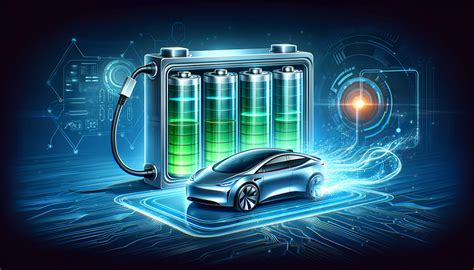The world of electric vehicles (EVs) is rapidly evolving, with advancements in battery technology playing a crucial role in shaping the future of transportation. As the demand for sustainable and environmentally friendly transportation solutions continues to grow, innovators and manufacturers are working tirelessly to push the boundaries of what is possible with EV battery technology.

Advancements in Battery Chemistry
One of the most significant areas of focus for EV battery innovation is the development of new battery chemistries. Traditional lithium-ion batteries have been the industry standard for years, but researchers are now exploring alternative chemistries that offer improved performance, safety, and sustainability.
Lithium-Ion vs. Solid-State Batteries
Solid-state batteries, for example, are being touted as a potential game-changer for the EV industry. By replacing the traditional liquid electrolyte with a solid material, these batteries offer improved safety, energy density, and charging speeds.

Lithium-Air Batteries: The Future of EV Range
Lithium-air batteries, on the other hand, have the potential to significantly increase the range of EVs. By harnessing the power of oxygen from the air, these batteries could offer energy densities up to 10 times greater than traditional lithium-ion batteries.

Battery Management Systems (BMS)
In addition to advancements in battery chemistry, the development of sophisticated battery management systems (BMS) is critical to optimizing EV performance and efficiency.
Real-Time Monitoring and Optimization
Modern BMS solutions utilize real-time monitoring and optimization techniques to ensure that EV batteries operate within their ideal parameters. This includes regulating temperature, voltage, and current to minimize degradation and maximize performance.

Advanced Charging Systems
Advances in charging systems are also crucial to the widespread adoption of EVs. Fast-charging technologies, such as DC Fast Charging, enable EVs to recharge to 80% in under 30 minutes, making long-distance travel more practical.

Recycling and Sustainability
As the demand for EVs continues to grow, the need for sustainable and responsible battery recycling practices becomes increasingly important.
Closed-Loop Recycling
Closed-loop recycling systems, which recover and reuse valuable materials from spent EV batteries, are being developed to minimize waste and reduce the environmental impact of EV production.

Second-Life Applications
Spent EV batteries can also be repurposed for second-life applications, such as energy storage for renewable energy systems or backup power for data centers.

Conclusion: A Bright Future for EVs
As we look to the future of EVs, it's clear that advancements in battery technology will play a critical role in shaping the industry. From new battery chemistries to sophisticated BMS and recycling practices, the innovations we're seeing today will pave the way for a more sustainable and efficient transportation landscape.






What are the benefits of solid-state batteries?
+Solid-state batteries offer improved safety, energy density, and charging speeds compared to traditional lithium-ion batteries.
How do lithium-air batteries work?
+Lithium-air batteries harness the power of oxygen from the air to generate electricity, offering potential energy densities up to 10 times greater than traditional lithium-ion batteries.
What are the advantages of closed-loop recycling for EV batteries?
+Closed-loop recycling systems recover and reuse valuable materials from spent EV batteries, minimizing waste and reducing the environmental impact of EV production.
As we look to the future of EVs, it's clear that advancements in battery technology will play a critical role in shaping the industry. From new battery chemistries to sophisticated BMS and recycling practices, the innovations we're seeing today will pave the way for a more sustainable and efficient transportation landscape.
Let's continue the conversation! Share your thoughts on the future of EV battery technology in the comments below.
